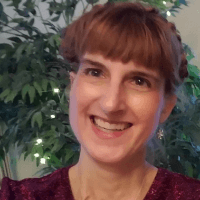
Kim Leary is a full-time oncology nurse, brain tumor survivor, and regular viewer of ABTA’s monthly educational webinars. We recently asked Kim how her brain tumor diagnosis impacted her life.
What type of brain tumor were you diagnosed with, and when? How did you and your loved ones react to your diagnosis?
I was diagnosed with a grade II astrocytoma in May 2011. I was okay with the diagnosis. Friends and family couldn’t believe it. Many people feel that cancer patients should look and sound ill. There is also the automatic assumption a brain tumor means poor prognosis. It is difficult to educate friends and family that while there is no cure for low grade glioma (LGG), we have many years of living with our LGG with prolonged effects from the tumor, radiation, and chemotherapy. Low grade gliomas are difficult, because they are like a dealing with a chronic disease.
How has your life changed as a result of a brain tumor diagnosis?
I have bothersome effects such as less stamina, paresthesias (a burning or prickling feeling in the extremities), insomnia, headaches, unusual sensory changes, and, worst of all for me is cognitive deficits, which I am able to hide. The only place I can discuss how I am truly feeling is with my brain tumor support group. Otherwise friends and family are usually dismissive. My support group is the place for LGGs. I have met all kinds of brain tumor patients in the group, and we can all relate on some level, no matter where in the journey we are.
Tell us about your experience with working full-time and living with a brain tumor.
At the time, I am the only person in my support group who works. There has been a time when I thought I couldn’t because my work is very demanding, but after taking cognitive tests, it was recommended that working would help keep my brain going. If I stopped, my cognitive function would decline faster. I will say it has been a great challenge, especially at times when there is more going on than I think I can handle, but at this point, it’s one day at a time. I still go to the neuro-oncologist every six months and have an MRI. And I attend the brain tumor support group monthly unless out of town for work. The LGG journey can be difficult and long. The ABTA brings information when we need it the most, and brings us together – we need each other.
Please tell us about your experience with the ABTA’s educational webinars?
Since I have been an oncology nurse for 30 years, I like to seek out knowledge on anything new for grade II astrocytomas or treatments for the side effects of LGG. As a member of the American Society of Clinical Oncology (ASCO), I receive all ASCO medical journals. However, it is rare to find articles about brain tumors in the journal. It is difficult to find current information for LGGs.
However, I found the ABTA through online research and have enjoyed their webinars, because they usually include information about LGG. I also learn about other brain tumors, particularly meningioma. These webinars confirm that I am not “out of my mind.” The symptoms and cognitive decline I continue to experience really exist. I feel validated that I am not the only person out there feeling these symptoms. People diagnosed with LGG may be physically active, working, and taking care of ourselves, but that doesn’t always translate into feeling well.
I would like others to know the ABTA webinar series is an especially useful resource for those who do not have any knowledge about their disease. My husband attended the last one with me, and he received a lot of new information. When it doesn’t come from me, he listens! ABTA is an important resource for all of us. We don’t always know everything, and I am always looking for new information.
What are some words of encouragement for others on a similar brain tumor journey?
Listen to the ABTA webinar series or attend their patient and caregiver conferences. Join a support group so that you can stay positive and take care of yourself. As much as possible, keep your life the same as it was before diagnosis. Live your life for you, not for the cancer. Since I don’t know when and if the tumor will progress, I have completed my bucket list, and now I make it a priority to have fun first, then do housework. When not working, I try to go out and socialize, and what doesn’t get done at home doesn’t get done. My husband understands, and he is a supportive spouse.
Register for an Upcoming Webinar
Be sure to visit the ABTA website, where you can register for upcoming webinars or watch previous webinars anytime.
Our upcoming webinar is:
April 25, 1:00 pm CST
Altering Metabolism for Brain Tumor Therapy: Food for Thought
Adrienne Scheck, PhD and Leonora Renda, MS, RDN
Looking for more information about brain tumors? Check out ABTA’s archived webinar series online.
